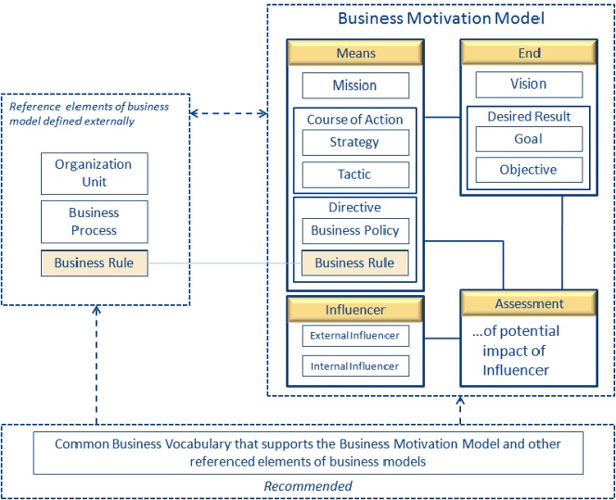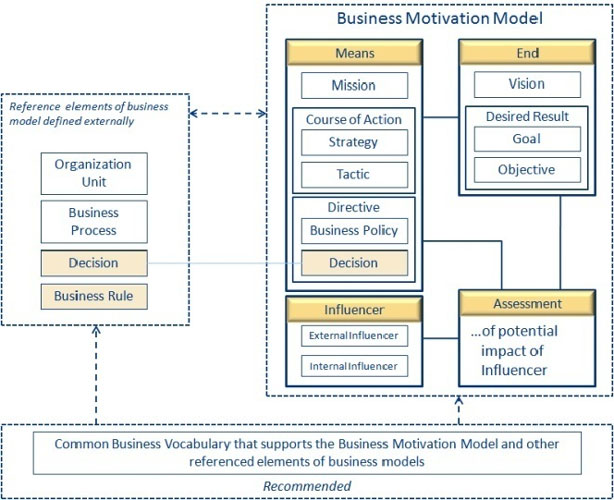The Decision’s the Thing…
“The play’s the thing / wherein I will capture the conscience of the King” Hamlet (II.ii. 582-583)
The development of “Business Rules Engines” (BRE) in the 1990’s stemmed from the Artificial Intelligence (AI) technology of 1980’s (as well as from 4GL development systems that implemented transactional related rules). The technology has evolved, and now consists of Business Rule Management Systems (BRMS). These are principally application development systems whose principal niche in the market is the ability to develop whole business solutions very rapidly. Around this technology has developed a community of integrators and users that is technology focused.
At the same time as this business rules technology was advancing, there developed a “Business Rules Approach”, which was pioneered by such practitioners as Ron Ross (G. R. Ross 1997) and Barbara von Halle (von Halle, Business Rules Applied 2002). These works highlighted the value of techniques for managing business rules, and treating them as an important business asset. This inspired continuing development, particularly on the tools for managing business rules from a business perspective, giving rise to a new class of tools called source rule repositories (SRR), software tools for the storage and management of rules expressed in a business friendly language.
Barbara von Halle (von Halle, Business Rules Applied 2002) first explored the close relationship between business rules and business process, through what she called the “decisions” to be found in “event details” in business processes. The early version of the STEP Methodology detailed in the book formalized the role of Decision as the primary re-usable artifact of the business rules approach, and the key relationship to business policy. Later versions of this methodology developed the formal theory of this relationship, including its mapping to Enterprise Architecture frameworks, properly establishing the role of the decision as the principal unifying point between business rules, business process and business policy.
Before the middle of the first decade of the millennium there emerged the understanding of the pivotal role played by Decisions as the appropriate means to manage business rules and relate them to both business process and business policy. Vendors such as Fair Isaac (“Enterprise Decision Management” (C. Hall 2005)), Ilog (“Transparent Decision Services” (Ilog 2006)), and Oracle (“Decision Services” (Nainani, Gruenefeldt and Mueller 2005)), each announced offerings in support. Indeed, Decision Management is an evolving theme at most major conferences today.
On 08/03/2006 OMG published the first interim specification of the “Business Motivation Model” (BMM). This is the OMG’s model of relationship between Business Vision, Mission, Strategy and Tactic, Business Policy and Business Rule. The evolving specification is a significant improvement over the earlier version of this model as it acknowledges the clear relationship between business policy, business rule and business process – an omission that plagued the first version of the BMM.
However, while a relationship is established in the latest version of the model, it is not clearly defined: moreover there is inexplicably no attempt to define “Decision”, nor show the clarifying and organizing role that such an entity could provide in this model.

Figure 1: Current OMG Business Motivation Model (BMM)

Figure 2: Proposed Amendment to the BMM, showing the addition of Decision
Given the focus by vendors on providing “Decision Services”, or in defining new categories like “Enterprise Decision Management” (Fair Isaac) or “Business Decision Management” (BPMInstitute.org, KPI), it would seem that the time has come to define the meaning of “Decision” within models that we wish to propose as standards. We submit our own ideas: Figure 1 is taken from the current OMG interim specification: Figure 2 is our own amendment to that specification that clearly describes the de facto role that “Decision” today plays in this model.
In Figure 2 we represent Decision as the means by which Business Policy is implemented. We also show that the Decision is how we realize Business Policy in our Business Processes. It is quite true that Decisions are in turn made up of specific Business Rules. (The relationship between Decisions and the Business Rules of which they consist are the subject of a further discussion in these pages: it is sufficient for us to say here that it is a predictable relationship that can be successfully modeled.) So in Figure 2 we see clearly the pivotal role that Decision plays in connecting (1) Motivation and (2) Business Rules to Business Process. This is the theoretical underpinning of EDM, BDM or just plain Decision Services.
We often quote James Taylor, co-author of “Smart (Enough) Systems” (Taylor, Raden; Prentice Hall 2007), when he famously said at a Brainstorm panel “The dirty secret of the business rules world is that the business is not interested in business rules: they are interested in deciding who is a preferred customer, or what is the amount of credit we can grant to an applicant”. In other words, the business is interested in answers to the business question of the moment: that sounds suspiciously like decisions to us. It is in the operational decisions of our daily business life that the crucial business outcomes are determined. If our abstractions, our models, do not properly represent these operational decisions then how will we be able to manage these crucial outcomes?

















